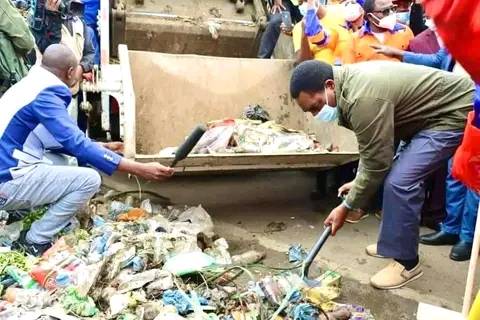
By Jemimah Chungu
Zambia, a nation grappling with a severe cholera outbreak, finds itself at the intersection of a health crisis and environmental challenges. Since December 2023, a water and foodborne acute illness have claimed numerous lives, with close to 5000 recorded cases as of January 5, 2024.
Cholera, caused by the bacterium Vibrio cholerae, tends to surge during the rainy season. While this acute illness sternly affects few parts of the world, sub-Saharan Africa, including Zambia, bears a disproportionate burden. The key link lies in environmental degradation, notably poor waste management prevalent in the current Zambian situation.
Human activities play a crucial role in driving factors behind cholera outbreaks. Improper waste management and inadequate sanitary systems contribute to drainage blockages, floods, open sewers, and water contamination during the rainy season. These issues serve as key drivers in activating and spreading the cholera bacterium.
People, while not creating the Vibrio cholerae bacterium, are responsible for its spread. Improper waste management and poor sanitary systems, intensified during the rainy season, lead to drainage blockages, floods, and water contamination—creating a conducive environment for cholera transmission.
Regrettably, the source of this environmental issue is not adequately addressed in the country. Despite efforts to treat the current pandemic, comprehensive measures to permanently eradicate cholera are lacking. Ministerial bodies, including the Ministry of Health within the political environment, the legal system, and the education system, have not fully embraced measures to curb environmental degradation leading to cholera.
In response to the crisis, Zambia’s Ministry of Health spearheaded by Sylvia Masebo, is undertaking a cholera awareness campaign, emphasizing prevention and treatment measures. The initiative, shared on social media through “MOBILE CHOLERA SENSITIZATION OUTREACH,” aims to increase public awareness about the seriousness of cholera and the importance of preventive measures.
While awareness campaigns are crucial, a holistic approach is needed. Ministerial bodies need to encompass means to curb environmental degradation fully. This includes adopting robust waste management systems, upgrading sanitation infrastructure, and addressing issues like open-air defecation pollution. Without these interventions, the specter of cholera may persist.
The current cholera pandemic serves as a stark reminder of the intricate relationship between public health and environmental sustainability. Only through comprehensive measures addressing the root causes can Zambia hope to eradicate cholera permanently.

